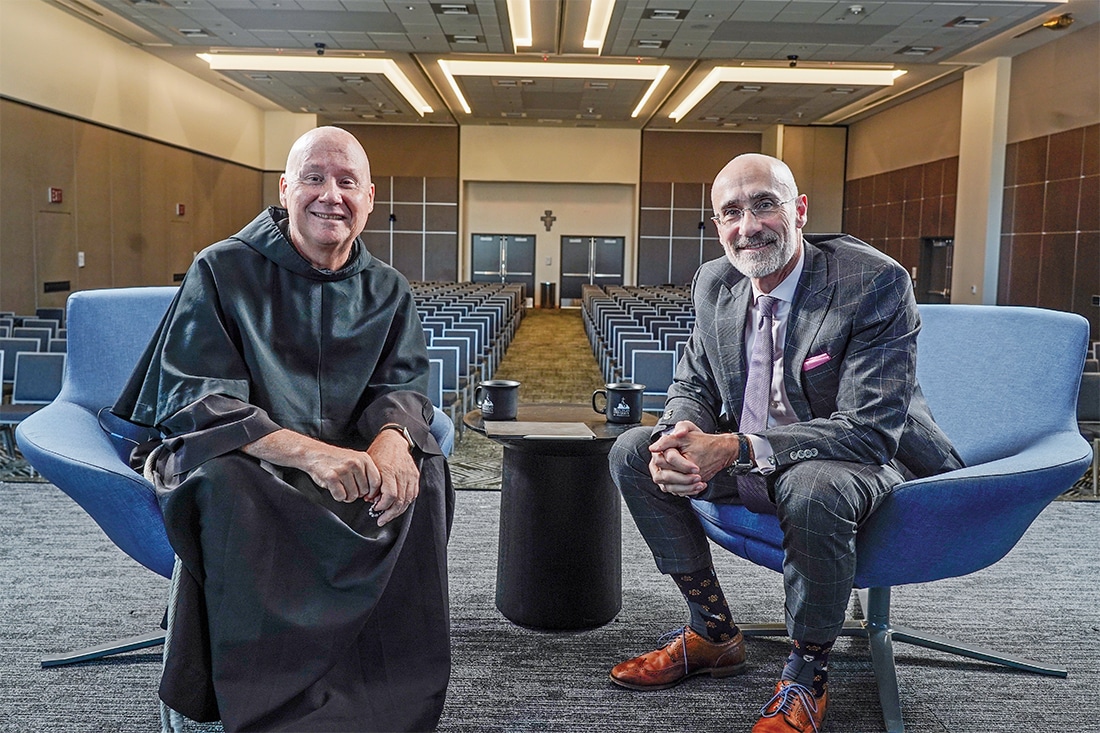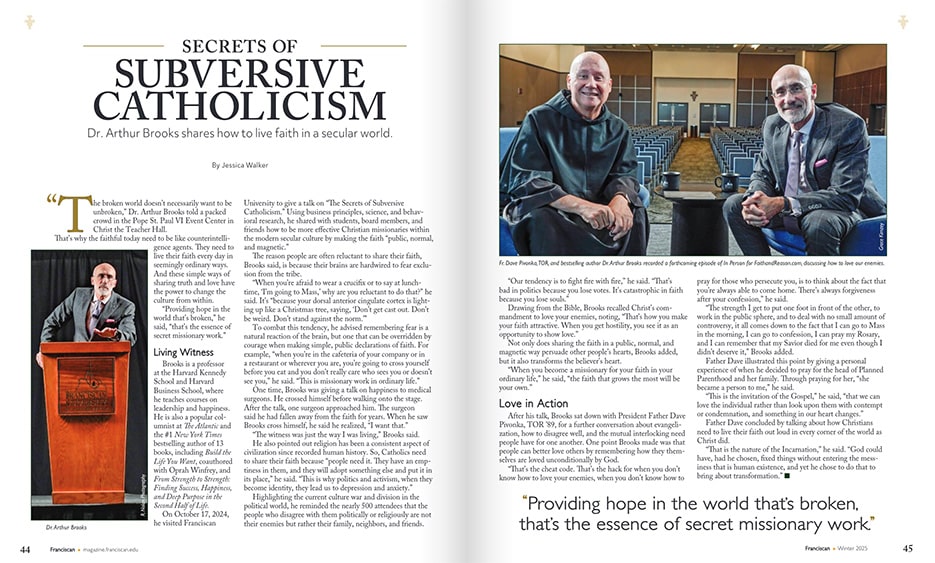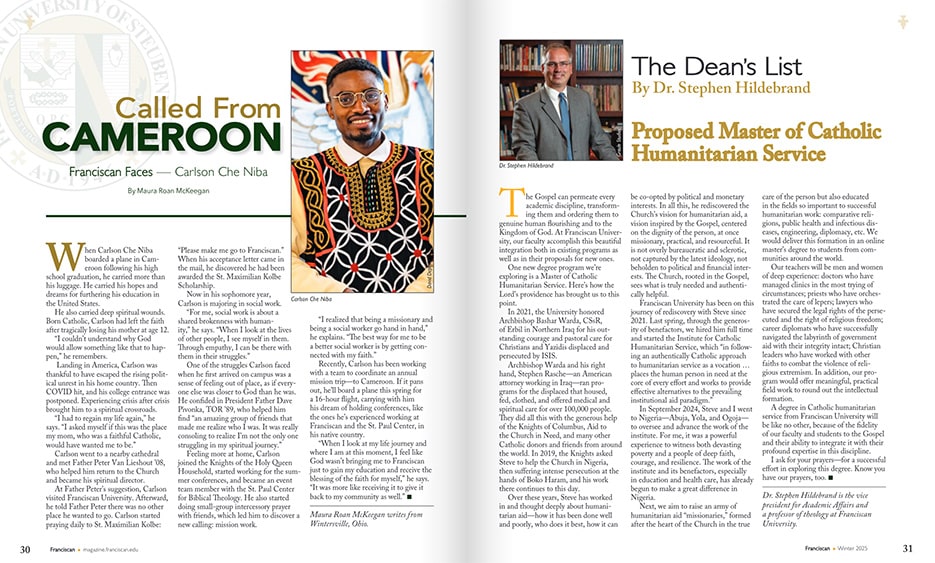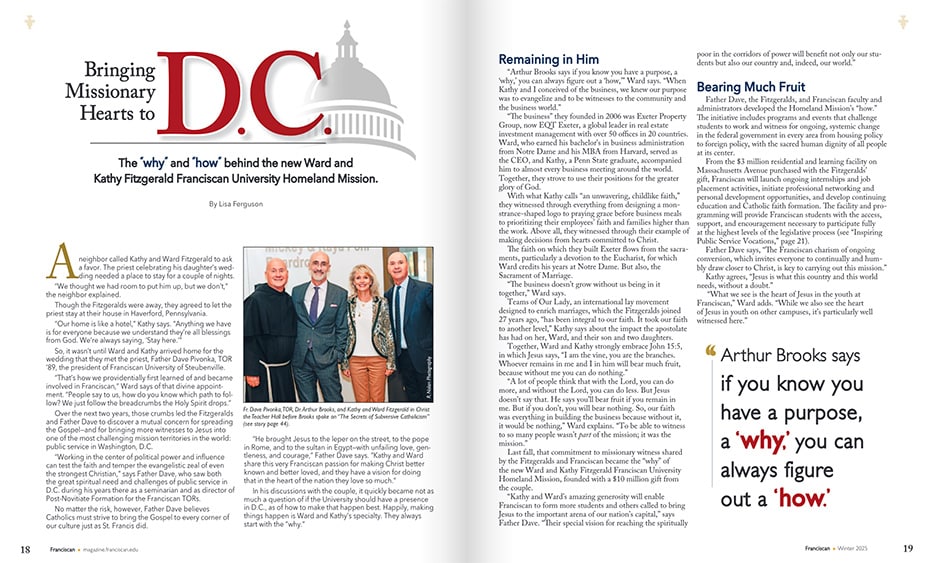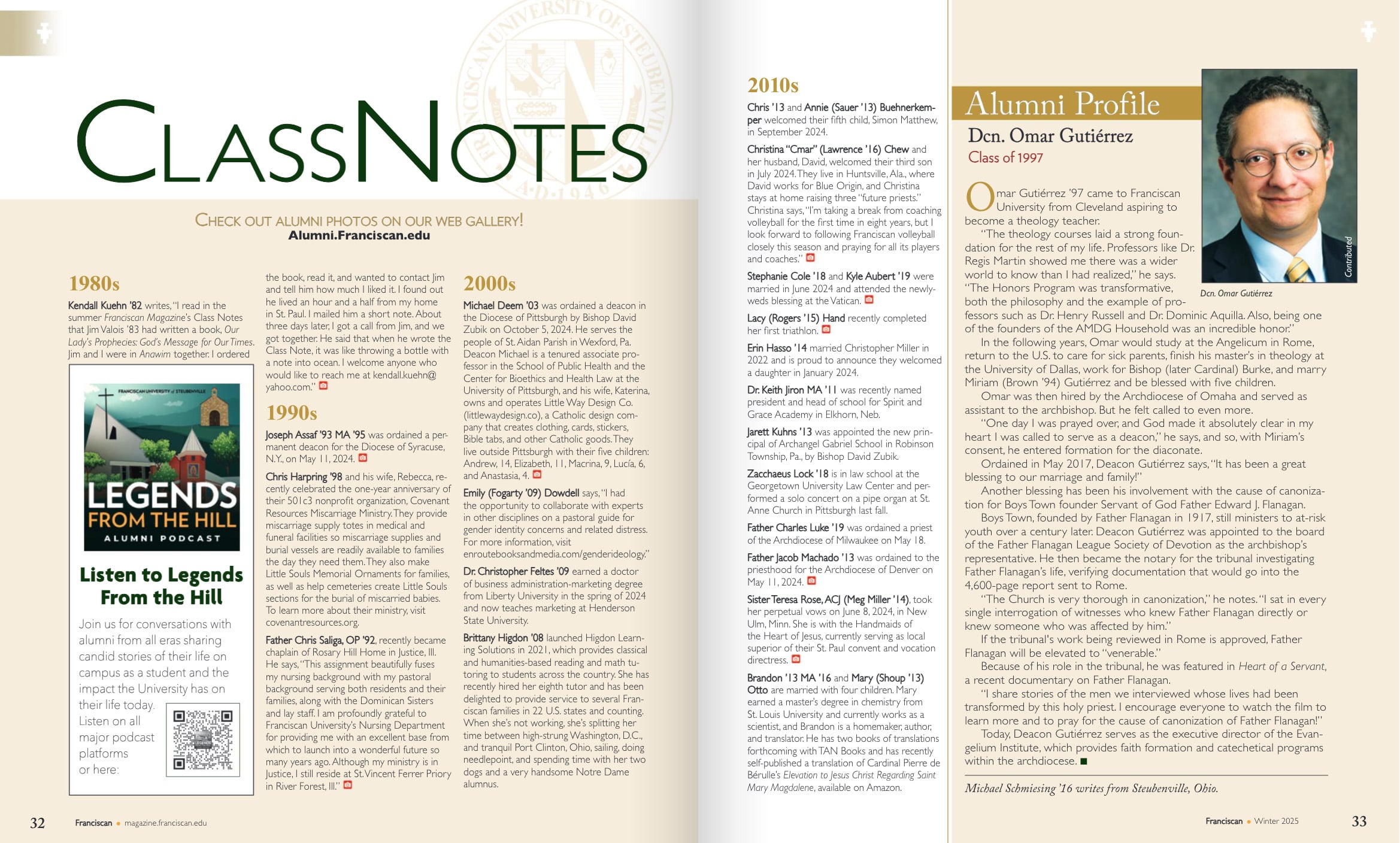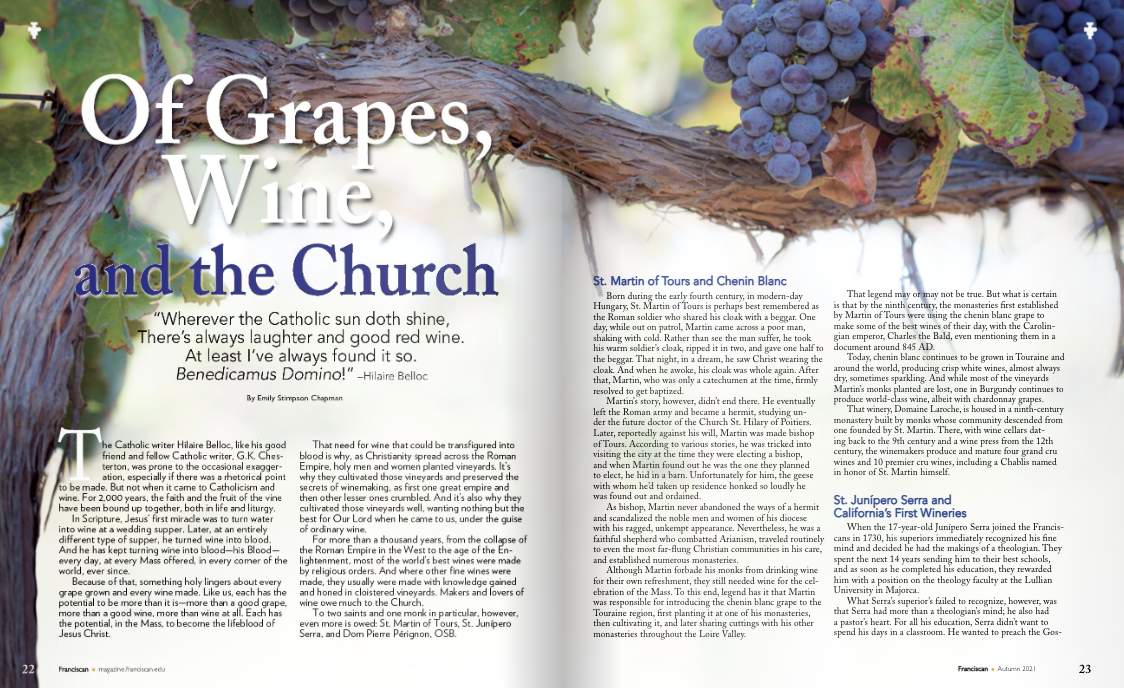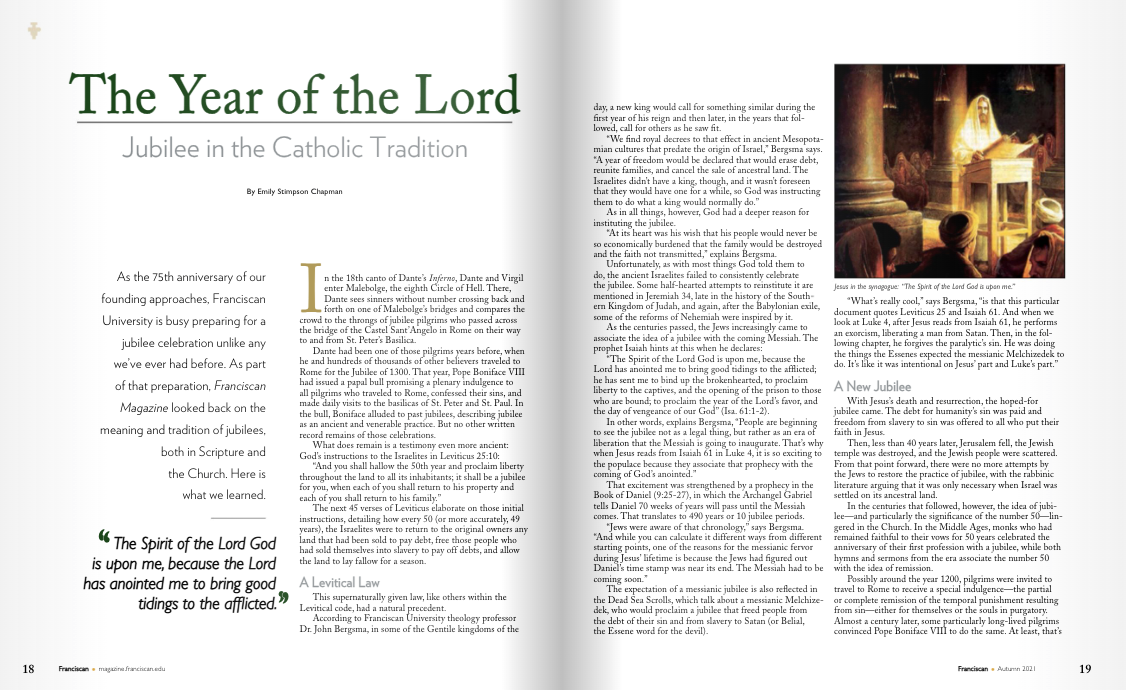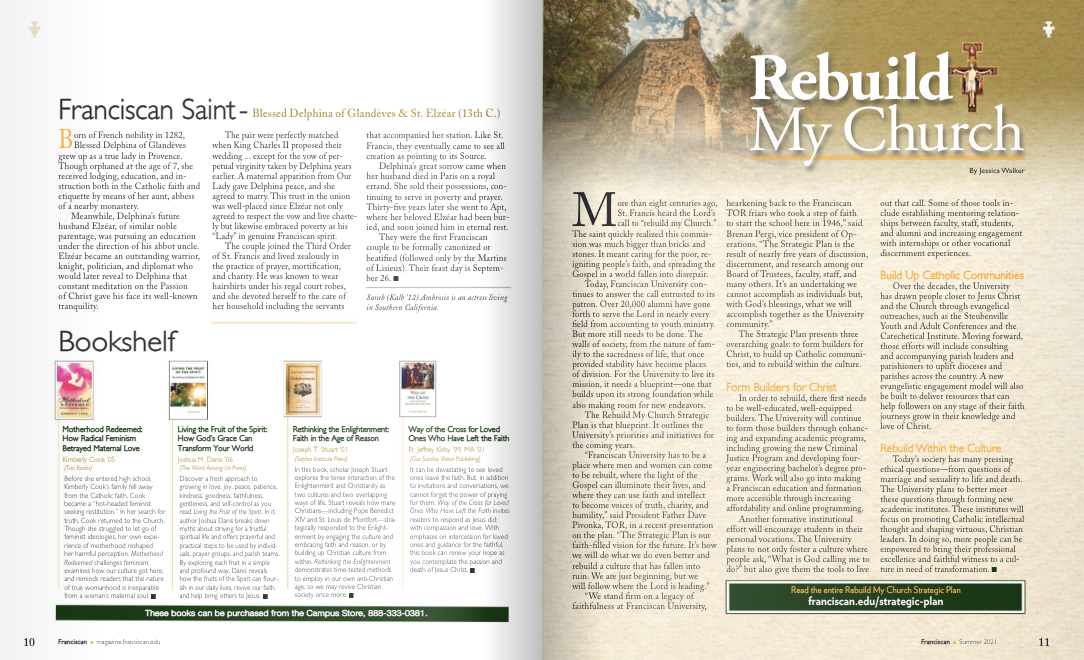The broken world doesn’t necessarily want to be unbroken,” Dr. Arthur Brooks told a packed crowd in the Pope St. Paul VI Event Center in Christ the Teacher Hall.
That’s why the faithful today need to be like counterintelligence agents. They need to live their faith every day in seemingly ordinary ways. And these simple ways of sharing truth and love have the power to change the culture from within.
“Providing hope in the world that’s broken,” he said, “that’s the essence of secret missionary work.”
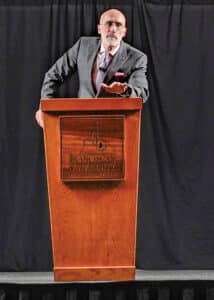 Living Witness
Living Witness
Brooks is a professor at the Harvard Kennedy School and Harvard Business School, where he teaches courses on leadership and happiness. He is also a popular columnist at The Atlantic and the #1 New York Times bestselling author of 13 books, including Build the Life You Want, coauthored with Oprah Winfrey, and From Strength to Strength: Finding Success, Happiness, and Deep Purpose in the Second Half of Life.
On October 17, 2024, he visited Franciscan University to give a talk on “The Secrets of Subversive Catholicism.” Using business principles, science, and behavioral research, he shared with students, board members, and friends how to be more effective Christian missionaries within the modern secular culture by making the faith “public, normal, and magnetic.”
The reason people are often reluctant to share their faith, Brooks said, is because their brains are hardwired to fear exclusion from the tribe.
“When you’re afraid to wear a crucifix or to say at lunchtime, ‘I’m going to Mass,’ why are you reluctant to do that?” he said. It’s “because your dorsal anterior cingulate cortex is lighting up like a Christmas tree, saying, ‘Don’t get cast out. Don’t be weird. Don’t stand against the norm.’”
To combat this tendency, he advised remembering fear is a natural reaction of the brain, but one that can be overridden by courage when making simple, public declarations of faith. For example, “when you’re in the cafeteria of your company or in a restaurant or wherever you are, you’re going to cross yourself before you eat and you don’t really care who sees you or doesn’t see you,” he said. “This is missionary work in ordinary life.”
One time, Brooks was giving a talk on happiness to medical surgeons. He crossed himself before walking onto the stage. After the talk, one surgeon approached him. The surgeon said he had fallen away from the faith for years. When he saw Brooks cross himself, he said he realized, “I want that.”
“The witness was just the way I was living,” Brooks said. He also pointed out religion has been a consistent aspect of civilization since recorded human history. So, Catholics need to share their faith because “people need it. They have an emptiness in them, and they will adopt something else and put it in its place,” he said. “This is why politics and activism, when they become identity, they lead us to depression and anxiety.”
Highlighting the current culture war and division in the political world, he reminded the nearly 500 attendees that the people who disagree with them politically or religiously are not their enemies but rather their family, neighbors, and friends. “Our tendency is to fight fire with fire,” he said. “That’s bad in politics because you lose votes. It’s catastrophic in faith because you lose souls.”
Drawing from the Bible, Brooks recalled Christ’s commandment to love your enemies, noting, “That’s how you make your faith attractive. When you get hostility, you see it as an opportunity to show love.”
Not only does sharing the faith in a public, normal, and magnetic way persuade other people’s hearts, Brooks added, but it also transforms the believer’s heart.
“When you become a missionary for your faith in your ordinary life,” he said, “the faith that grows the most will be your own.”
Love in Action
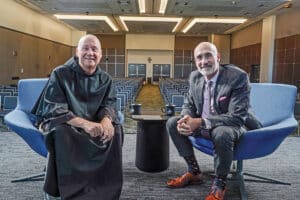 After his talk, Brooks sat down with President Father Dave Pivonka, TOR ’89, for a further conversation about evangelization, how to disagree well, and the mutual interlocking need people have for one another. One point Brooks made was that people can better love others by remembering how they themselves are loved unconditionally by God.
After his talk, Brooks sat down with President Father Dave Pivonka, TOR ’89, for a further conversation about evangelization, how to disagree well, and the mutual interlocking need people have for one another. One point Brooks made was that people can better love others by remembering how they themselves are loved unconditionally by God.
“That’s the cheat code. That’s the hack for when you don’t know how to love your enemies, when you don’t know how to pray for those who persecute you, is to think about the fact that you’re always able to come home. There’s always forgiveness after your confession,” he said.
“The strength I get to put one foot in front of the other, to work in the public sphere, and to deal with no small amount of controversy, it all comes down to the fact that I can go to Mass in the morning, I can go to confession, I can pray my Rosary, and I can remember that my Savior died for me even though I didn’t deserve it,” Brooks added.
Father Dave illustrated this point by giving a personal experience of when he decided to pray for the head of Planned Parenthood and her family. Through praying for her, “she became a person to me,” he said.
“This is the invitation of the Gospel,” he said, “that we can love the individual rather than look upon them with contempt or condemnation, and something in our heart changes.”
Father Dave concluded by talking about how Christians need to live their faith out loud in every corner of the world as Christ did.
“That is the nature of the Incarnation,” he said. “God could have, had he chosen, fixed things without entering the messiness that is human existence, and yet he chose to do that to bring about transformation.”



